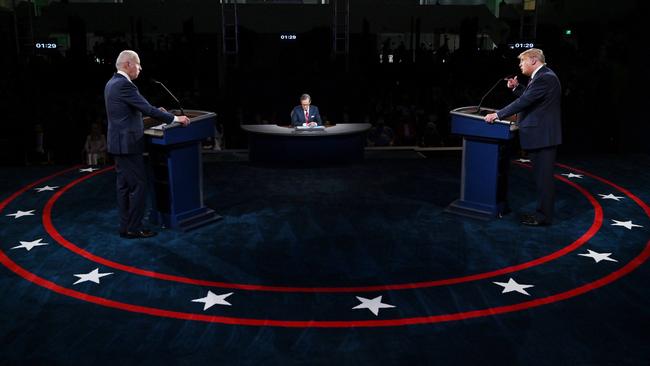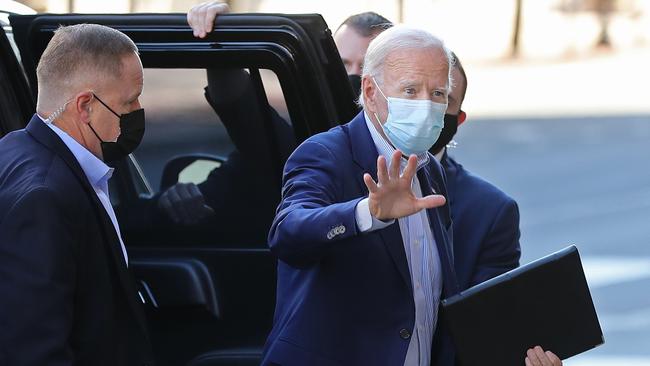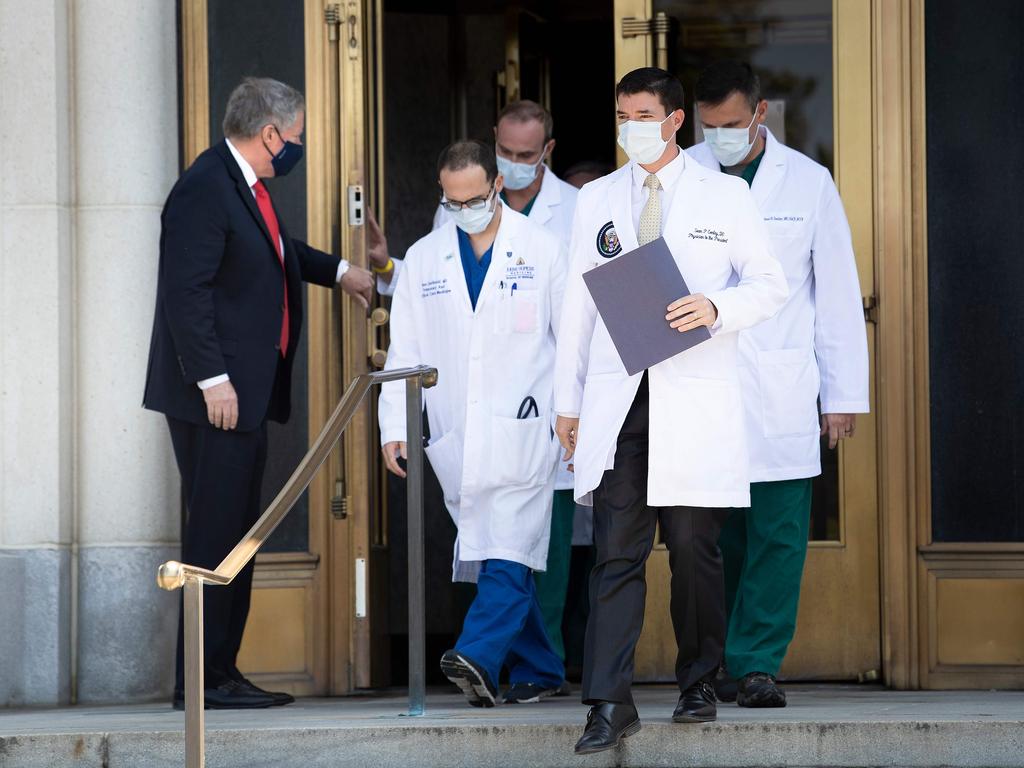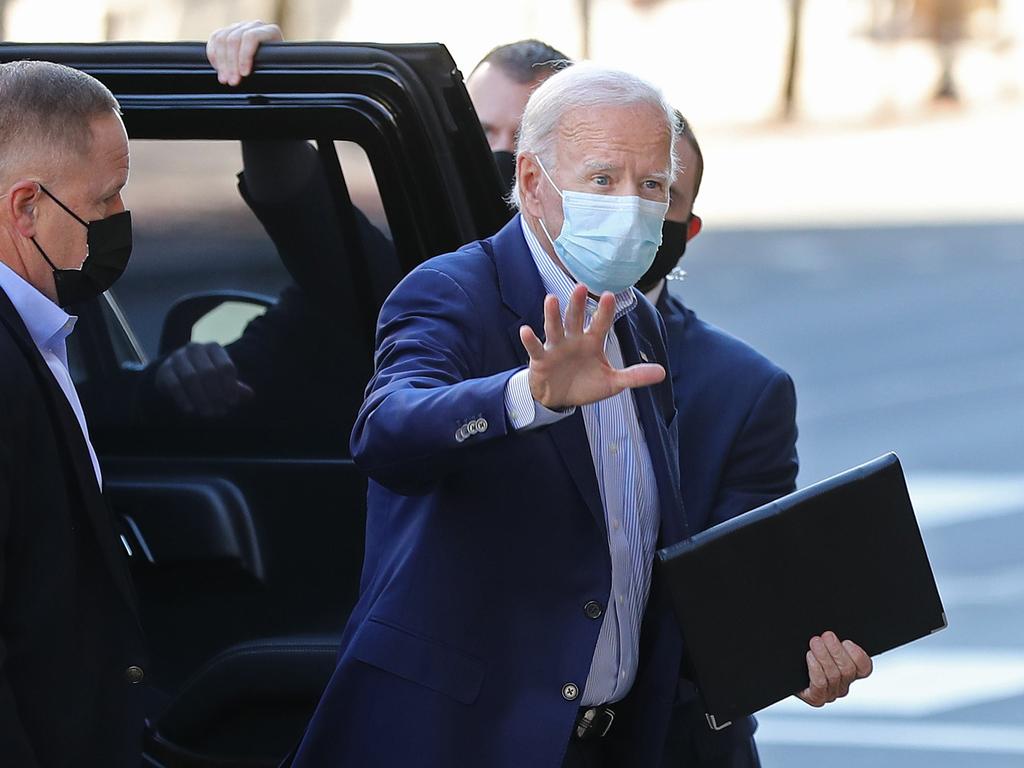Biden scores 14-point lead over Trump in poll after debate
Democrat draws support of 53 per cent of registered voters, as GOP incumbent’s backing falls to 39 per cent.

US President Donald Trump is drawing his weakest voter support of the year in his re-election race following last week’s contentious debate with Democrat nominee Joe Biden, the latest Wall Street Journal/NBC News poll finds.
Mr Biden leads the President, 53 per cent to 39 per cent, among registered voters in the new poll, which was conducted in the two days following the debate last Tuesday (Wednesday AEDT) but before news emerged that Mr Trump had tested positive for COVID-19.
The former vice-president’s 14-percentage-point lead compares with an eight-point advantage last month and 11 points in July, which was his largest of the campaign at that time.
The survey finds something rare in Journal/NBC News polling: evidence that an individual news event — the debate — is having a material effect on Mr Trump’s political standing, at least for now. Significant events in the past, such as Mr Trump’s impeachment by the House of Representatives and acquittal by the Senate, had only hardened views of the President, not shifted them.
Bill McInturff, a Republican pollster who directed the survey with Democrat Jeff Horwitt, cautioned that the poll was conducted during an unsettled moment after the caustic presidential debate — “a shock to the system,” he called it — and could reflect a temporary reassessment of views.
“The public can be taking a moment to say, ‘What did I just see, and how do I feel about it?’” he said.
Mr Trump could regain ground, Mr McInturff said, given that “he has a history of bouncing back to some set point”.
For now, though, the poll represents a number of flashing caution signs for the President. His support has never before fallen below 40 per cent on the ballot against Mr Biden.
Women, who outnumber men in the electorate, favour Mr Biden in the survey by 27 points, 60 per cent to 33 per cent, compared with 20 points last month. At the same time, support for Mr Trump has softened among some of his most loyal groups, such as white, working-class men.

Negative views of the President dominate positive ones by 16 points in the new survey, up from 11 points last month, and the share of voters with “very negative” views has hit 50 per cent for the first time since Mr Trump took office. Meanwhile, views of Mr Biden turned net positive for the first time since 2018, though narrowly so.
Mr Horwitt and Mr McInturff said one factor was the debate, a decorum-destroying event in which the two candidates traded insults and continually talked over each other, with Mr Trump interrupting his opponent more often. About three-quarters of voters said the event made no difference to their vote. But among the other 25 per cent, a bigger share said the debate made them more likely to support Mr Biden than Mr Trump.
While 84 per cent of Democrats said Mr Biden did a better job in the debate, 54 per cent of Republicans said so of the President. Overall, half of voters said Mr Biden performed better, with a quarter saying Mr Trump did. Some 17 per cent said neither candidate did well.
Asked more broadly about the candidates’ personal qualities, voters by a two-to-one margin said Mr Biden was better at displaying “the right temperament to be president”, 58 per cent to 26 per cent.
“It is clear that the debate, and Mr Trump’s behaviour during it, reinforced the negative side of Mr Trump personally for many respondents,” Mr Horwitt said.
He said the President “lost the American people on style more than substance”.
“What we know for sure is that the debate had consequence, at least initially,” said Mr McInturff, who noted that big events had tumbled over each other quickly and that public attention had now turned to the repercussions of Mr Trump contracting COVID-19.
Two more debates are planned between Mr Trump and Mr Biden — on October 15 in Miami and October 22 in Nashville, Tennessee — though the President’s coronavirus infection might affect that schedule. Vice-President Mike Pence and Kamala Harris are slated to debate on Thursday AEDT at the University of Utah.
Voters in the survey viewed Mr Trump as better suited han his challenger to handle the economy, 48 per cent to 41 per cent. But the poll found Mr Trump struggling to gain traction on other issues in a campaign that has shifted focus from racial justice to his call for more “law and order” and, more recently, to a Supreme Court vacancy. Mr Biden leads two-to-one on which candidate can best handle race relations, and he holds single-digit leads on handling crime and making Supreme Court nominations, the poll found.
Now, Mr Trump’s bout with the virus will likely keep the public focused on the pandemic, an issue that voters believe Mr Biden would be better at handling, 52 per cent to 35 per cent.
The poll also found voters divided over the nomination of Amy Coney Barrett to replace the late Ruth Bader Ginsburg on the Supreme Court, though many voters say they don’t yet have an opinion on the matter.
Some 35 per cent say they support the nomination, with 34 per cent opposing it and 30 per cent undecided. Views of Judge Barrett’s nomination show record partisanship: Some 76 per cent of Republicans support the selection, the largest share of a president’s party backing a high court pick in Journal/NBC News polling dating to the selection of now-Chief Justice John Roberts in 2005.
Half of voters say the winner of the presidential election should fill the Supreme Court seat, compared with 38 per cent who would move ahead with Mr Trump’s nomination now—essentially the same shares who support Mr Biden and Mr Trump in the election.
In the new survey, 45 per cent of voters identified as Democrats and 36 per cent as Republicans, a nine-point gap that is larger than the average six-point advantage for Democrats in prior Journal/NBC News polling this year. Journal/NBC News pollsters don’t adjust the sample to meet benchmarks for party identification, as they do for other voter characteristics, such as race. That is because people often shift their party identification in tandem with changing feelings about the two parties and their candidates.
The electorate, for example, included equal shares of Democrats and Republicans when then-president George W. Bush won re-election in 2004, exit polls found. But more people identified as Democrats than as Republicans, by about 7 points, during Barack Obama’s two victories in 2008 and 2012.
The Journal/NBC News pollsters said they detected no sign that Republicans disproportionately declined to participate in the poll or to answer their phones.
The survey of 800 registered voters was conducted on September 30 and October 1. The margin of error was plus or minus 3.5 points.
The Wall Street Journal





To join the conversation, please log in. Don't have an account? Register
Join the conversation, you are commenting as Logout